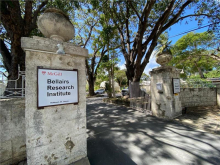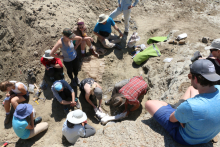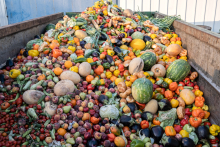
Understanding when and why people give bribes
McGill-led researchers developed a model of the factors that go into citizens’ calculations about whether to bribe officials, information that can help authorities fight corruption.

Universal genetic testing of breast cancer patients could help many
A new study demonstrates how universal genetic testing for breast cancer can ensure no patient is missed for advanced therapies.

McGill University, the Center of Science and Industry (COSI), and the U.S. State Department Commemorate 70 Years of McGill’s Bellairs Research Institute in Barbados with a Full Day of STEAM Programming
McGill University, the Center of Science and Industry (COSI), and the U.S. State Department today teamed up to host a full day of Science, Technology, Engineering, Arts, and Math (STEAM) activities and presentations to honour the 70th anniversary of McGill’s acclaimed Bellairs Research Institute in Barbados and promote STEAM education to students in Barbados.

Retailers boost profits while improving eating habits of clientele
Convenience stores can help customers improve their eating habits while at the same time boosting both their own sales and profits. It’s as simple as offering customers the choice between healthy snacks and pastries as a low-cost add-on to their cup of coffee, according to a new study out of McGill.

Addressing the mental health impacts of conflicts and climate change
As violent conflicts, forced migration, and an increase in natural disasters sparked by climate change trigger rising humanitarian needs around the globe, a new initiative to understand how to better support the mental health of those affected is being launched at McGill University, thanks to a visionary gift from Flagship Pioneering Founder and CEO and Co-Founder and Chairman of Moderna, Noubar Afeyan, BEng’83, DSc’22, and his wife, Anna Afeyan Gunnarson.

Pregnancy enhances natural immunity to block severe flu
McGill University scientists have discovered that pregnancy may trigger a natural immunity to boost protection against severe flu infection.
Contrary to the common belief that pregnancy increases vulnerability to infections, researchers found that it strengthened an immune defense in mice, blocking the Influenza A virus from spreading to the lungs, where it can cause severe infection.

Lab-grown brain cells help uncover new targets for Parkinson’s treatments
Scientists have uncovered a new link between the immune system and the development of Parkinson’s disease.
Researchers at The Neuro (Montreal Neurological Institute-Hospital) at McGill University have discovered that an immune response plays a key role in how toxic protein clumps, known as Lewy bodies, form in brain cells and contribute to disease.

McGill-linked AXIS mission is one of two finalists in NASA selection process
NASA has selected the Advanced X-ray Imaging Satellite (AXIS) mission, co-investigated by McGill University Professor Daryl Haggard, to advance to the next stage of its $1 billion space probe competition.

Satisfaction among REM users is up after one year of operation, McGill study finds
User satisfaction with the Réseau express métropolitain (REM) has increased since its first line opened in the summer of 2023, preliminary results from a survey by Transportation Research at McGill (TRAM) indicate.
Since 2019, TRAM has been conducting a longitudinal study on the REM. Preliminary results indicate that among the close to 1,700 REM users who participated in the survey this fall:

Cannabis disrupts brain activity in young adults prone to psychosis: study
Young adults at risk of psychosis show reduced brain connectivity, a deficit that cannabis use appears to worsen, a new study has found. The breakthrough paves the way for psychosis treatments targeting symptoms that current medications miss.

Saskatchewan’s first Centrosaurus and Citipes elegans fossils discovered by McGill researchers
Paleontologists and students from McGill University have documented Saskatchewan's first confirmed fossil specimens of Centrosaurus, a horned dinosaur species closely related to Triceratops.

New technology rapidly measures antioxidants in maple syrup
Researchers at McGill University have developed an eco-efficient, user-friendly technology that quickly measures the antioxidant content of maple syrup. The innovative method contributes to increasing transparency about a health-related aspect of the syrup's nutritional value and allows for on-site quality testing without the need for costly lab assessments.

Time in nature benefits children with mental health difficulties: study
A team of researchers from McGill and Université de Montréal’s Observatoire pour l’éducation et la santé des enfants (OPES, or observatory on children’s health and eduation), led by Sylvana Côté, spending two hours a week of class time in a natural environment can reduce emotional distress among 10- to 12-year-olds who had the most significant mental health problems before the program began.

Better education can mitigate post-harvest food losses, increase global food security
Better educating farmers and food processors about how to avoid post-harvest food losses – which amount to one-third of global food production, worth US$1 trillion annually – would reduce global food insecurity, according to researchers at McGill University.

Temporary sound installations could help reduce noise pollution: study
Temporary sound installations can be a low-cost way of dealing with noise pollution in areas of high urban density, McGill University researchers have found.
Dubbed the “new second hand smoke,” noise pollution can have consequences ranging from simple annoyance to such serious health problems as hearing loss and high blood pressure and can exacerbate various mental health conditions.

